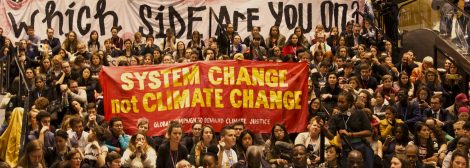“Communities in the South are being hit by the impacts of climate change and dirty energy now. It’s not a question of the future, it’s a question of now, it’s a question of survival now”, warned environmental activist Sara Shaw, from Friends of the Earth [1], on Wednesday.
“We are participating in these mobilizations to stand with people being impacted now as well”, added Shaw, during an interview with Real World Radio in her capacity as coordinator of the environmental federation’s work on climate justice and energy.
Friday will mark the beginning of a week of global action for the future and for climate justice, with activities anticipated in 150 countries. According to the organizers – themselves a diverse range of people and groups – these mobilizations could become the largest global protest against climate inaction. They will peak on September 27 with the Global Climate Strike.
September 20-27 will be a week of actions organized by “Reclaim Power”, a movement which gathers social movements, international networks, non-governmental organizations and others, to fight against dirty energy and for the peoples’ rights to public, renewable and community-controlled energy.
Sara Shaw stated that Friends of the Earth International supports the September 20-27 mobilizations [2], highlighting that Friends of the Earth groups in Germany, the UK, the US, El Salvador and Japan, among other countries, will organize actions.
Global protests will coincide with the Climate Action Summit convened by the UN Secretary General António Guterres on September 23 in New York, USA. Its official goal is that governments increase their national contributions to reducing polluting emissions by 2020 in order to halt climate change.
Friends of the Earth International warns that they don’t have high expectations for the outcomes . “We will probably hear some big speeches from lots of people but whether we see the response that we need to the climate crisis in New York is unlikely”, said Shaw. The environmental activist also regretted that they only speak of climate change mitigation (reducing emissions) and not about adaptation and finance, which are so important for countries that already suffer the effects of the crisis and need clean development pathways.
Nevertheless, Friends of the Earth International representatives from Uganda and Nigeria will be present at the Summit, to elevate the voices of those affected by climate change and dirty energy.
Meanwhile, environmental activist Ricardo Navarro of CESTA (Friends of the Earth El Salvador) told Real World Radio that “it is important that leaders meet, because they are the ones who will have to make decisions, but they are out of focus.” He explained that although it is clear that we cannot continue emitting greenhouse gases, governments are looking for alternatives which do not really address the crisis. Countries are negotiating “how to make some modifications, or if they should tax carbon a bit higher or even look for ways to absorb it… But the thing is they are not challenging the real causes of the problem, which is the economic and political system itself.”
Navarro added that humanity is also suffering a serious biodiversity crisis [3]. “We are mortgaging the future”, he warned.
Activist Hanae Takahashi, from Friends of the Earth Japan [4], stated that she hopes governments will increase their national contributions to reducing emissions and demanded that the Japan government raise their ambition levels. “One thing Japan can do is to double the amount of climate funds they provide”, she said. Takahashi also made reference to the upcoming mobilization plans.
When asked about the climate crisis, Navarro stated that “we urgently need to change the entire economic, ideological and political system of the planet”, repeatedly emphasizing “urgently”. He also said that the unity of different social groups, such as feminist organizations, peasants, environmental activists, trade union members and others, is key to push for these changes. “I feel quite optimistic when I see that Friends of the Earth International has extremely good relations with Vía Campesina, with the World March of Women, with workers and other environmental groups of course”, said Navarro.
Meanwhile, Shaw declared that a radical system change is needed, with real solutions, and a just transition away from fossil fuels and false solutions, such as nuclear energy, large hydropower, agrofuels, waste incineration, among other forms of dirty energy.
